Charles E W Bean, Diaries, AWM38 3DRL 606/283/1 - August - September 1919
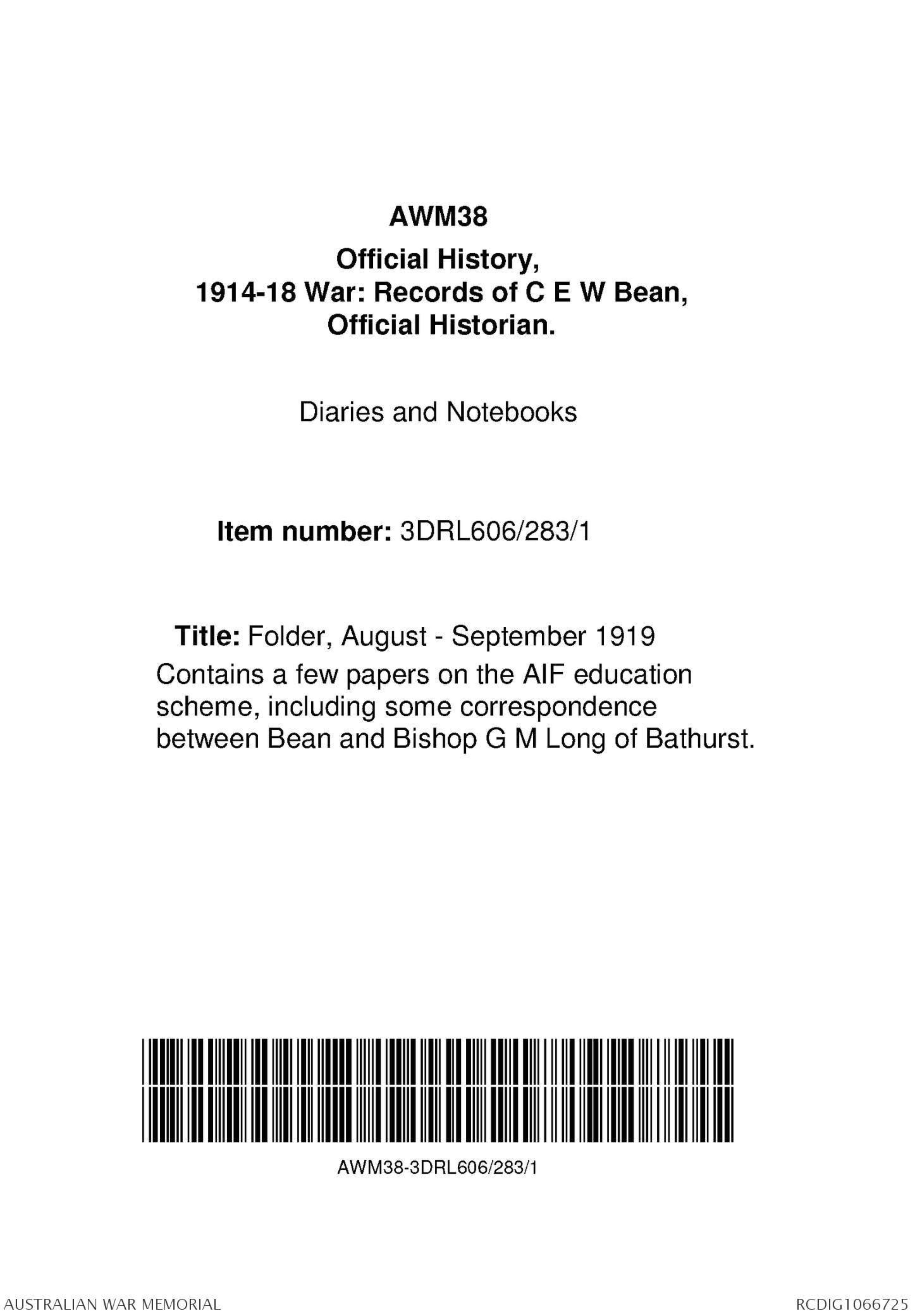
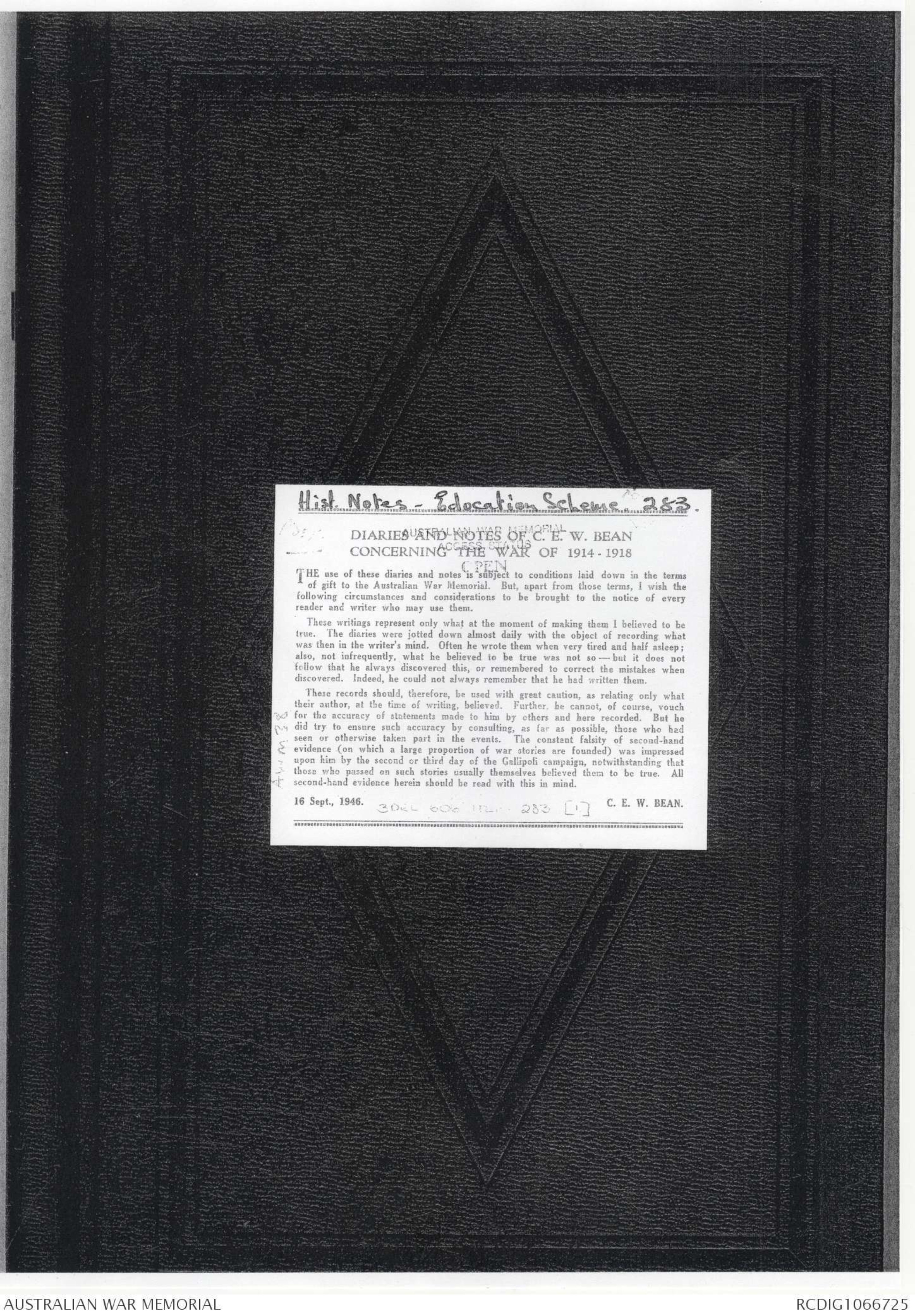
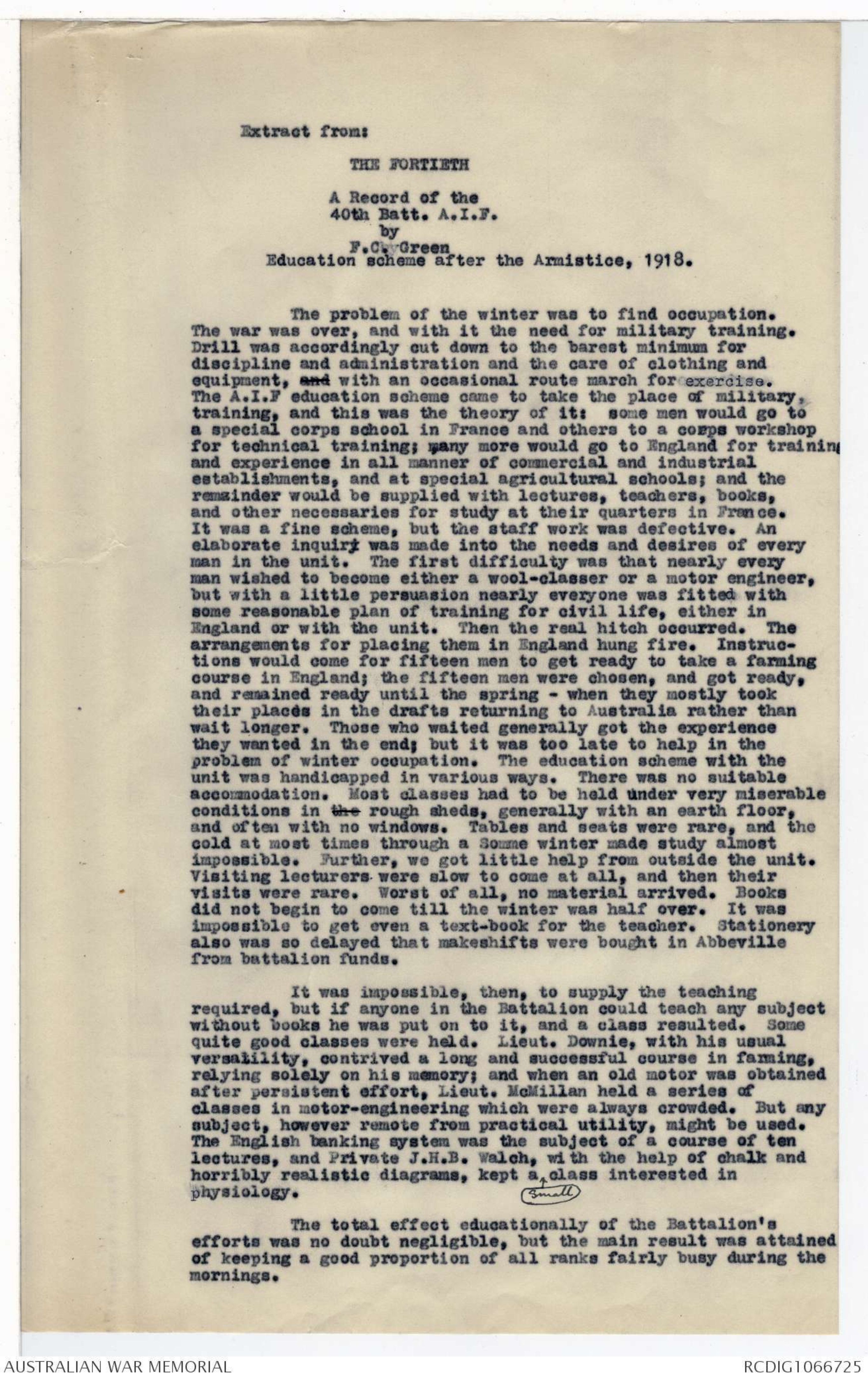
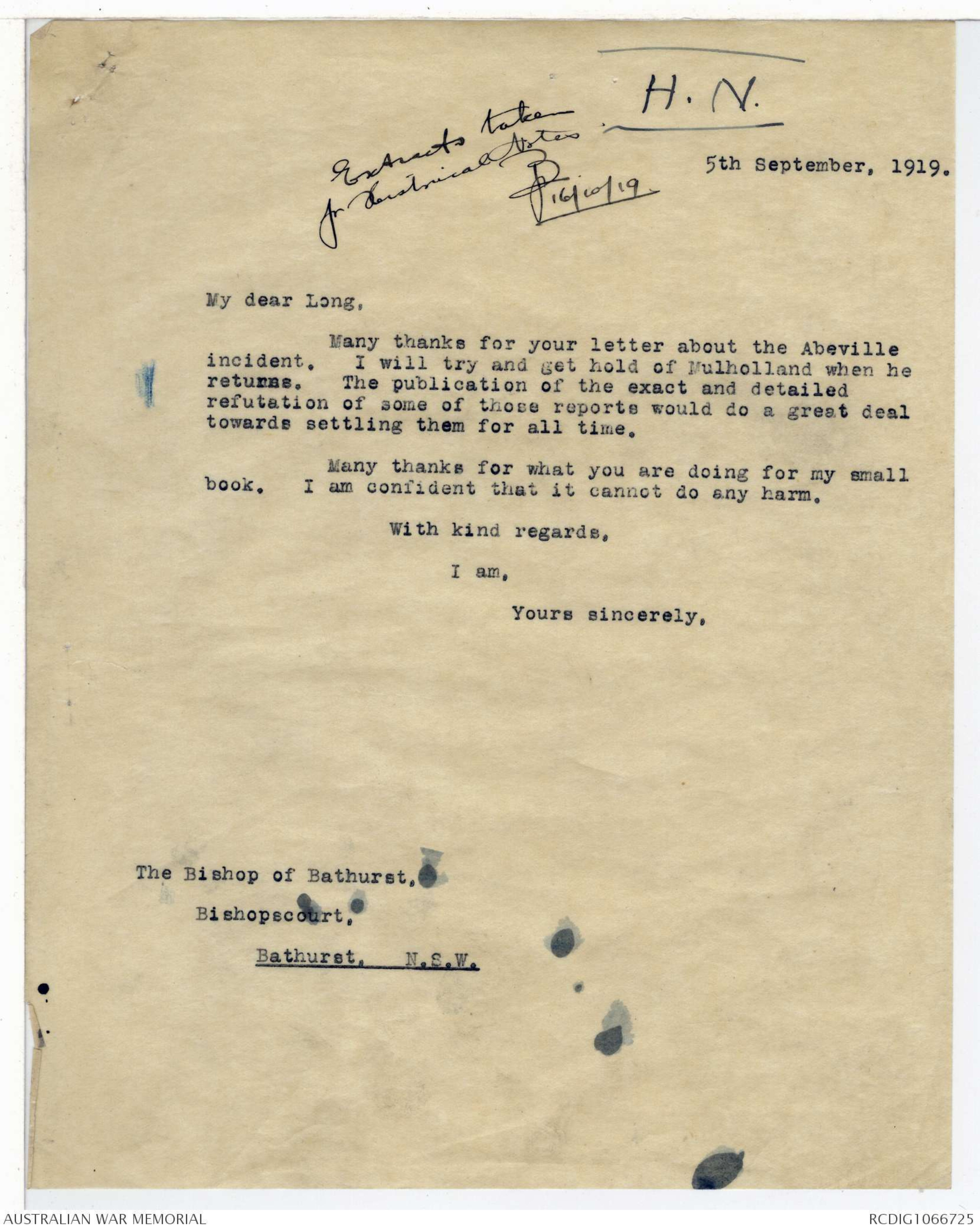
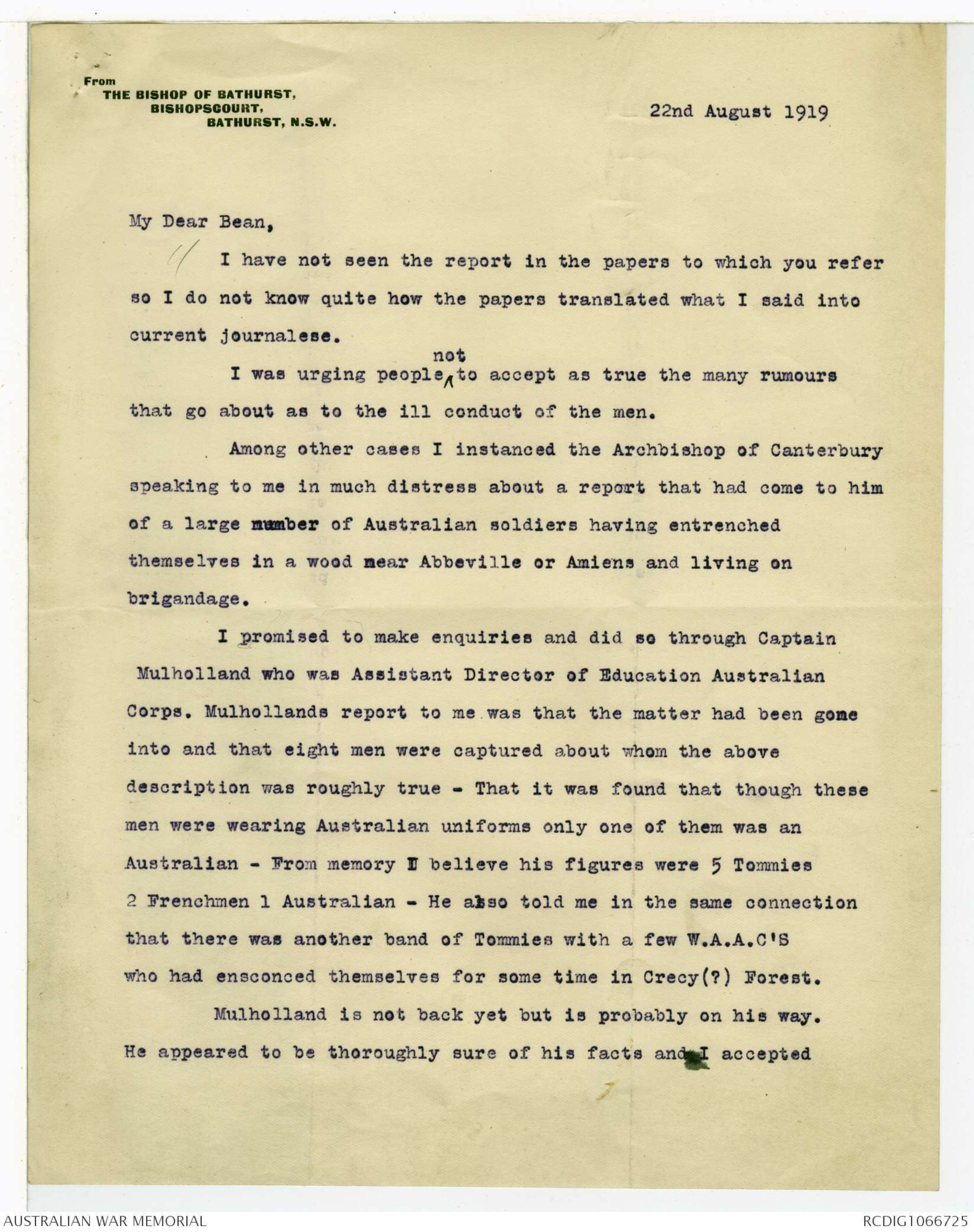
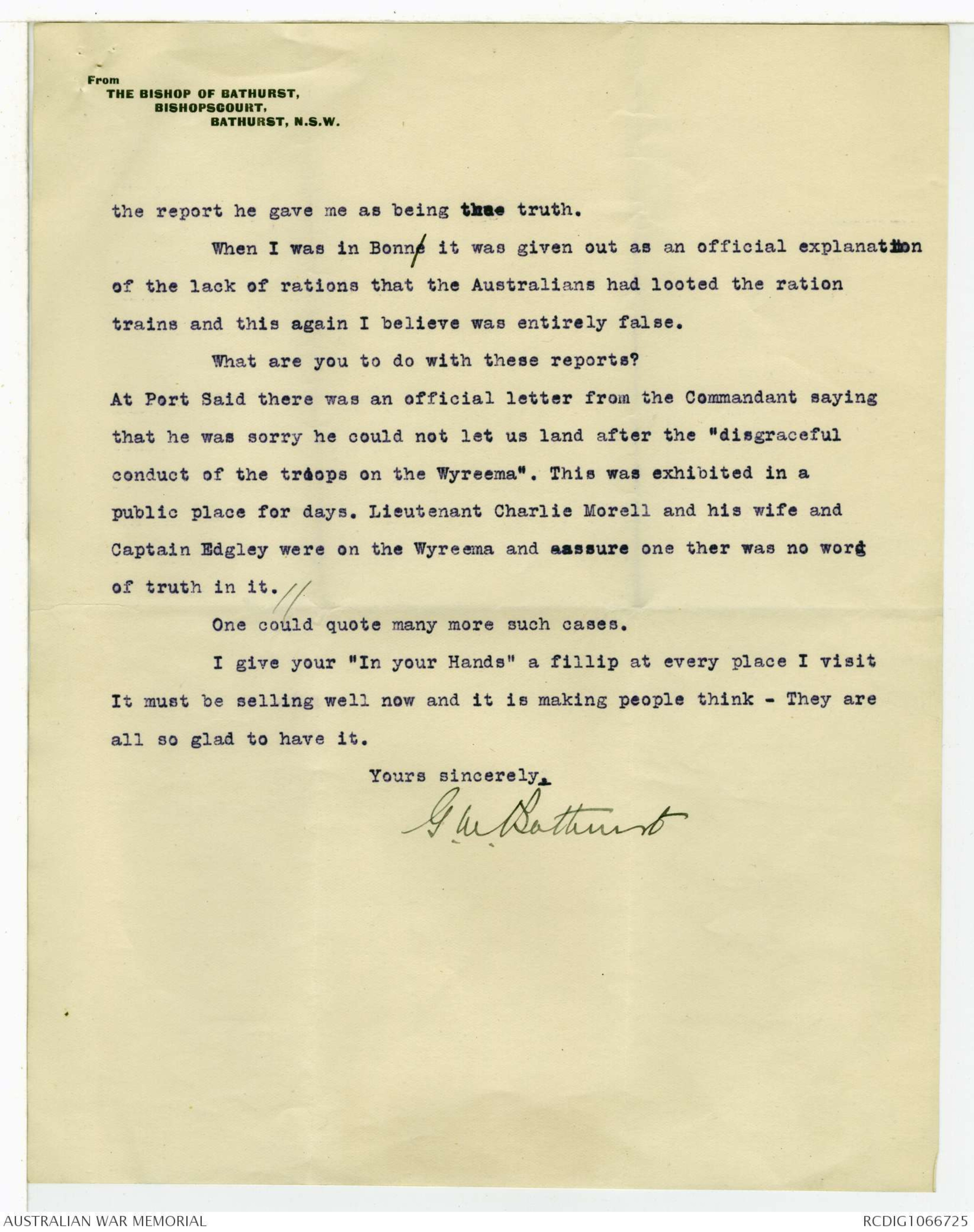
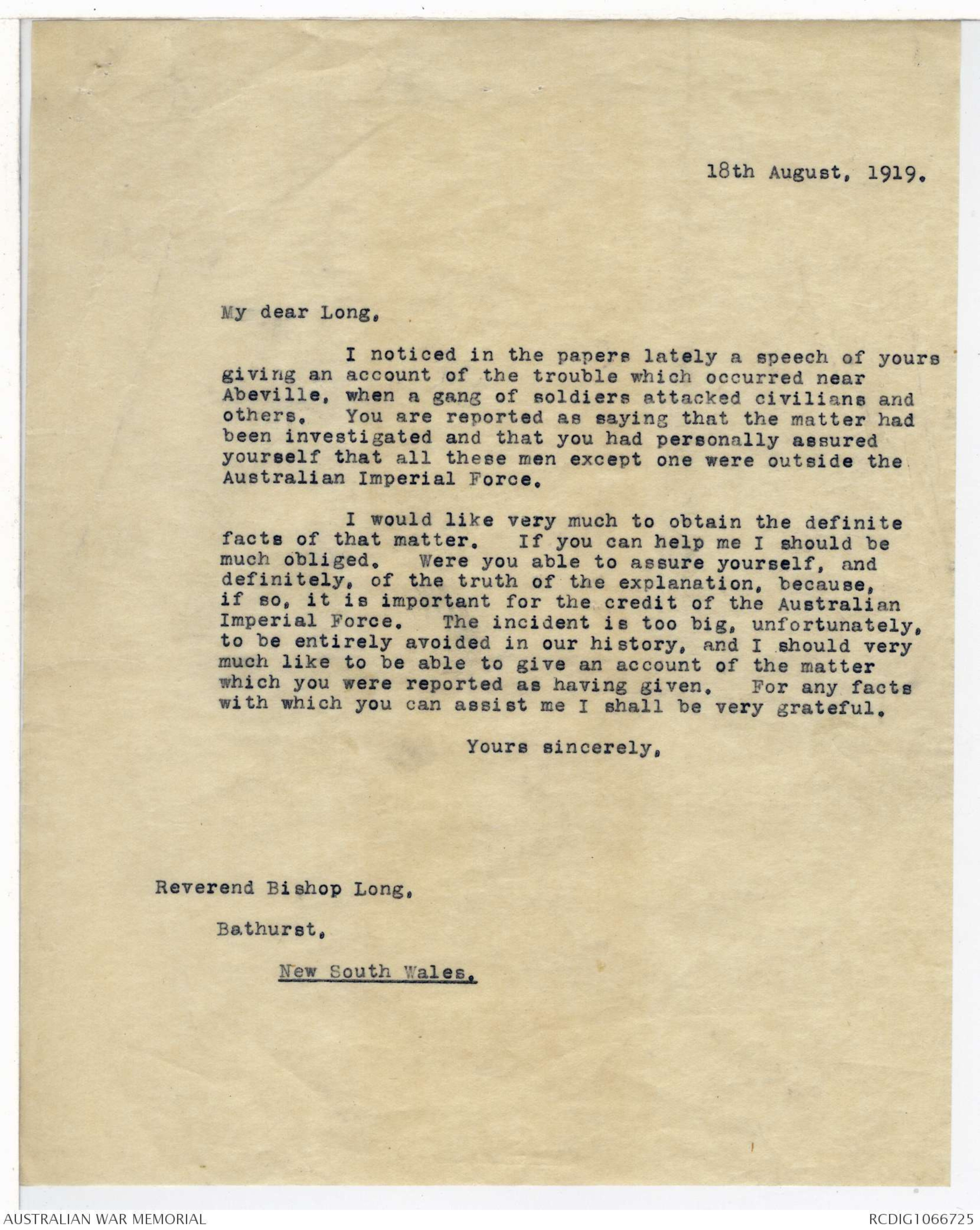
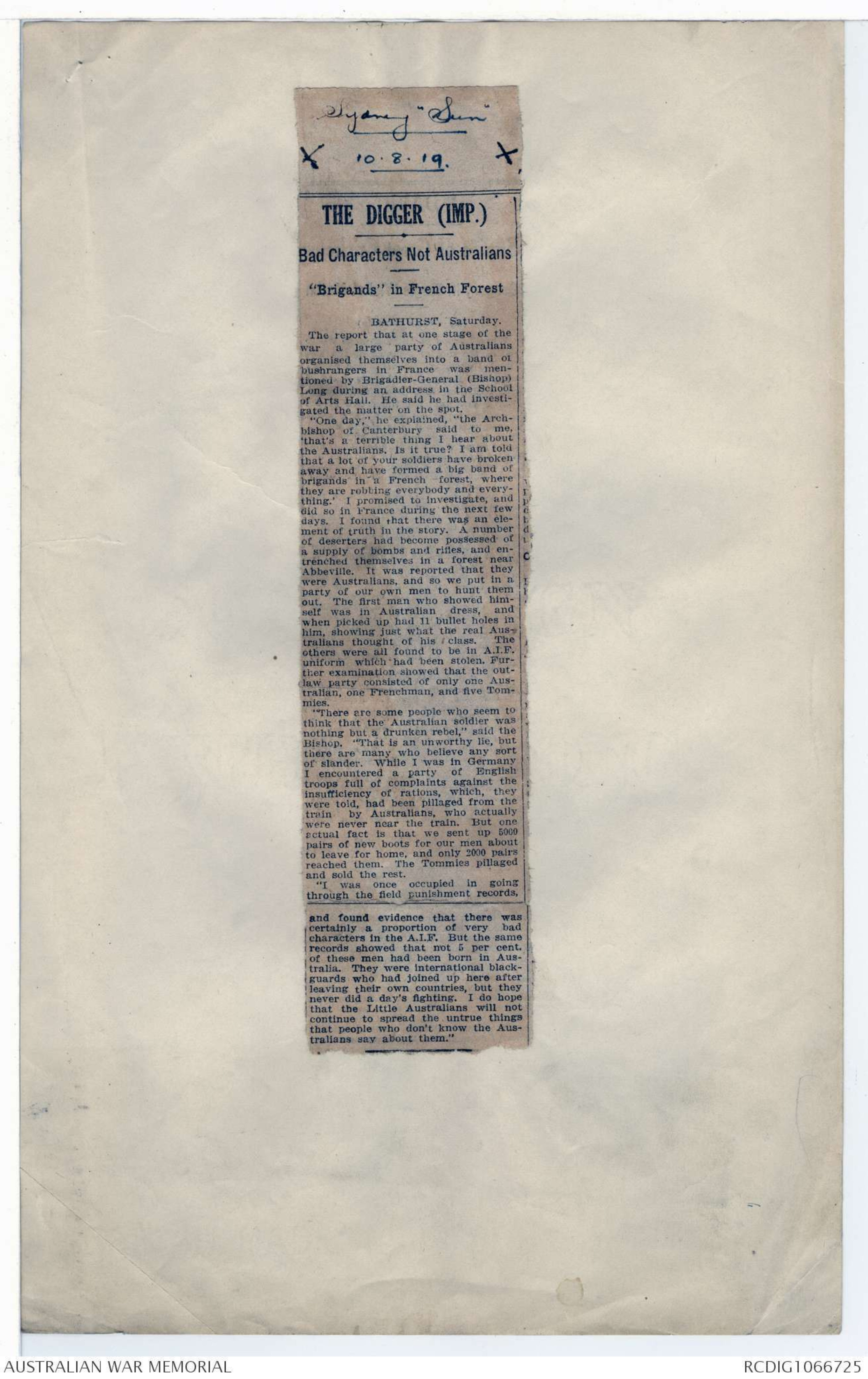
AWM38
Official History,
1914-18 War: Records of C E W Bean,
Official Historian.
Diaries and Notebooks
Item number: 3DLR606/283/1
Title: Folder, August - September 1919
Contains a few papers on the AIF education
scheme, including some correspondence
between Bean and Bishop G M Long of Bathurst.
AWM38-3DRL606/283/1
Hist. Notes - Education Scheme. 283
AUSTRALIAN WAR MEMORIAL
ACCESS STATUS
OPEN
DIARIES AND NOTES OF C. E. W. BEAN
CONCERNING THE WAR OF 1914-1918
THE use of these diaries and notes is subject to conditions laid down in the terms
of gift to the Australian War Memorial. But, apart from those terms, I wish the
following circumstances and considerations to be brought to the notice of every
reader and writer who may use them.
These writings represent only what at the moment of making them I believed to be
true. The diaries were jotted down almost daily with the object of recording what
was then in the writer’s mind. Often he wrote them when very tired and half asleep;
also, not infrequently, what he believed to be true was not so — but it does not
follow that he always discovered this, or remembered to correct the mistakes when
discovered. Indeed, he could not always remember that he had written them.
These records should, therefore, be used with great caution, as relating only what
their author, at the time of writing, believed. Further, he cannot, of course, vouch
for the accuracy of statements made to him by others and here recorded. But he
did try to ensure such accuracy by consulting, as far as possible, those who had
seen or otherwise taken part in the events. The constant falsity of second-hand
evidence (on which a large proportion of war stories are founded) was impressed
upon him by the second or third day of the Gallipoli campaign, notwithstanding that
those who passed on such stories usually, themselves believed them to be true. All
second-hand evidence herein should be read with this in mind.
16 Sept. 1946. C. E W. BEAN.
3DRL 606 112 283 [1]
[*AWM 38]
Extract from:
THE FORTIETH
A Record of the
40th Batt. A.I.F.
by
F.C. Green
Education scheme after the Armistice, 1918.
The problem of the winter was to find occupation.
The war was over, and with it the need for military training.
Drill was accordingly cut down to the barest minimum for
discipline and administration and the care of clothing and
equipment, and with an occasional route march for exercise.
The A.I.F education scheme came to take the place of military,
training, and this was the theory of it: some men would go to
a special corps school in France and others to a corps workshop
for technical training; many more would go to England for training
and experience in all manner of commercial and industrial
establishments, and at special agricultural schools; and the
remainder would be supplied with lectures, teachers, books,
and other necessaries for study at their quarters in France.
It was a fine scheme, but the staff work was defective. An
elaborate inquiry was made into the needs and desires of every
man in the unit. The first difficulty was that nearly every
man wished to become either a wool-classer or a motor engineer,
but with a little persuasion nearly everyone was fitted with
some reasonable plan of training for civil life, either in
England or with the unit. Then the real hitch occurred. The
arrangements for placing them in England hung fire. Instructions
would come for fifteen men to get ready to take a farming
course in England; the fifteen men were chosen, and got ready,
and remained ready until the spring - when they mostly took
their places in the drafts returning to Australia rather than
wait longer. Those who waited generally got the experience
they wanted in the end; but it was too late to help in the
problem of winter occupation. The education scheme with the
unit was handicapped in various ways. There was no suitable
accommodation. Most classes had to be held under very miserable
conditions in the rough sheds, generally with an earth floor,
and often with no windows. Tables and seats were rare, and the
cold at most times through a Somme winter made study almost
impossible. Further, we got little help from outside the unit.
Visiting lecturers were slow to come at all, and then their
visits were rare. Worst of all, no material arrived. Books
did not begin to come till the winter was half over. It was
impossible to get even a text-book for the teacher. Stationery
also was so delayed that makeshifts were bought in Abbeville
from battalion funds.
It was impossible, then, to supply the teaching
required, but if anyone in the Battalion could teach any subject
without books he was put on to it, and a class resulted. Some
quite good classes were held. Lieut. Downie, with his usual
versatility, contrived a long and successful course in farming,
relying solely on his memory; and when an old motor was obtained
after persistent effort, Lieut. McMillan held a series of
classes in motor-engineering which were always crowded. But any
subject, however remote from practical utility, might be used.
The English banking system was the subject of a course of ten
lectures, and Private J.H.B. Walch, with the help of chalk and
horribly realistic diagrams, kept a, ^ small class interested in
physiology.
The total effect educationally of the Battalion's
efforts was no doubt negligible, but the main result was attained
of keeping a good proportion of all ranks fairly busy during the
mornings.
[*H.N.
Extracts taken
for Historical notes
B
16/10/19 *]
5th September, 1919.
My dear Long,
Many thanks for your letter about the Abeville
incident. I will try and get hold of Mulholland when he
returns. The publication of the exact and detailed
refutation of some of those reports would do a great deal
towards settling them for all time.
Many thanks for what you are doing for my small
book. I am confident that it cannot do any harm,
With kind regards.
I am.
Yours sincerely,
The Bishop of Bathurst,
Bishopscourt,
Bathurst, N.S.W.
FROM
THE BISHOP OF BATHURST,
BISHOPSCOURT,
BATHURST. N.S.W.
22nd August 1919
My Dear Bean,
I have not seen the report in the papers to which you refer
so I do not know quite how the papers translated what I said into
current journalese.
I was urging people ^not to accept as true the many rumours
that go about as to the ill conduct of the men.
Among other cases I instanced the Archbishop of Canterbury
speaking to me in much distress about a report that had come to him
of a large number of Australian soldiers having entrenched
themselves in a wood near Abbeville or Amiens and living on
brigandage.
I promised to make enquiries and did so through Captain
Mulholland who was Assistant Director of Education Australian
Corps. Mulhollands report to me was that the matter had been gone
into and that eight men were captured about whom the above
description was roughly true - That it was found that though these
men were wearing Australian uniforms only one of them was an
Australian - From memory I believe his figures were 5 Tommies
2 Frenchmen 1 Australian - He also told me in the same connection
that there was another band of Tommies with a few W.A.A.C'S
who had ensconced themselves for some time in Crecy(?) Forest.
Mulholland is not back yet but is probably on his way.
He appeared to be thoroughly sure of his facts and I accepted
From
THE BISHOP OF BATHURST,
BISHOPSCOURT,
BATHURST, N.S.W.
the report he gave me as being thee truth.
When I was in Bonne it was given out as an official explanation
of the lack of rations that the Australians had looted the ration
trains and this again I believe was entirely false.
What are you to do with these reports?
At Port Said there was an official letter from the Commandant saying
that he was sorry he could not let us land after the "disgraceful
conduct of the troops on the Wyreema". This was exhibited in a
public place for days. Lieutenant Charlie Morell and his wife and
Captain Edgley were on the Wyreema and assure one ther was no word
of truth in it.
One could quote many more such cases.
I give your "In your Hands" a fillip at every place I visit
It must be selling well now and it is making people think - They are
all so glad to have it.
Yours sincerely.
G.W. BATHURST
18th August, 1919.
My dear Long,
I noticed in the papers lately a speech of yours
giving an account of the trouble which occurred near
Abeville, when a gang of soldiers attacked civilians and
others. You are reported as saying that the matter had
been investigated and that you had personally assured
yourself that all these men except one were outside the
Australian Imperial Force.
I would like very much to obtain the definite
facts of that matter. If you can help me I should be
much obliged. Were you able to assure yourself, and
definitely, of the truth of the explanation, because,
if so, it is important for the credit of the Australian
Imperial Force. The incident is too big, unfortunately,
to be entirely avoided in our history, and I should very
much like to be able to give an account of the matter
which you were reported as having given. For any facts
with which you can assist me I shall be very grateful.
Yours sincerely,
Reverend Bishop Long.
Bathurst,
New South Wales,
[*Sydney Sun
10.8.19 *]
THE DIGGER (IMP.)
Bad Characters Not Australians
"Brigands" in French Forest
BATHURST, Saturday.
The report that at one stage of the
war a large party of Australians
organised themselves into a band of
bushrangers in France, was mentioned
by Brigadier-General (Bishop)
Long during an address in the School
of Arts Hall. He said he had investigated
the matter on the spot.
"One day, " he explained, "the Archbishop
of Canterbury said to me,
"that's a terrible thing I hear about
the Australians. Is it true? I am told
that a lot of your soldiers have broken
away and have formed a big band of
brigands in a French forest, where
they are robbing everybody and everything."
I promised to investigate, and
did so in France during the next few
days. I found that there was an element
of truth in the story. A number
of deserters had become possessed of
a supply of bombs and rifles, and entrenched
themselves in a forest near
Abbeville. It was reported that they
were Australians, and so we put in a
party of our own men to hunt them
out. The first man who showed himself
was in Australian dress, and
when picked up had 11 bullet holes in
him, showing just what real Australians
thought of his class. The
others were all found to be in A.I.F
uniform which had been stolen. Further
examination showed that the outlaw
party consisted of only one Australian,
one Frenchman, and five Tommies.
"There are some people who seem to
think that the Australian soldier was
nothing but a drunken rebel," said the
Bishop. "That is an unworthy lie, but
there are many who believe any sort
of slander. While I was in Germany
I encountered a party of English
troops full of complaints against the
insufficiency of rations, which, they
were told, had been pillaged from the
train by Australians, who actually
were never near the train. But one
actual fact is that we sent up 5000
pairs of new boots for out men about
to leave for home, and only 2000 pairs
reached them. The Tommies pillaged
and sold the rest.
"I was once occupied in going
through the field punishment records,
and found evidence that there was
certainly a proportion of very bad
characters in the A.I.F. But the same
records showed that not 5 per cent.
of these men had been born in Australia.
They were international blackguards
who had joined up here after
leaving their own countries, but they
never did a day's fighting. I do hope
that the Little Australians will not
continue to spread the untrue things
that people who don't know the Australians
say about them."
 Sam scott
Sam scottThis transcription item is now locked to you for editing. To release the lock either Save your changes or Cancel.
This lock will be automatically released after 60 minutes of inactivity.